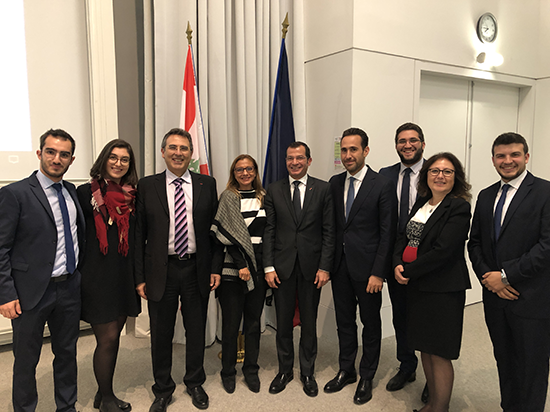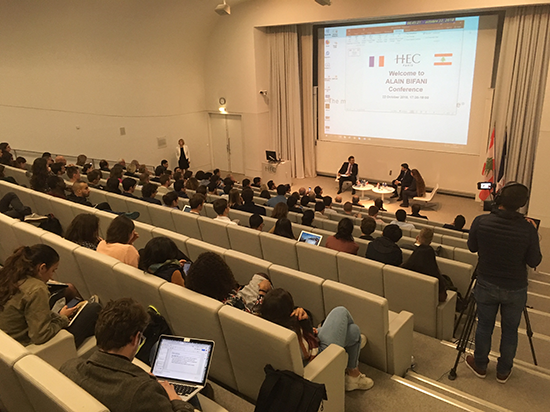Top Lebanese Civil Servant Warns of Dangers of Consensus Democracy
One of the Middle East’s top economists, Alain Bifani, shared with a sizable audience at HEC’s Bellon Amphitheater his vision of the challenges his native Lebanon faces in the field of consensus democracies and its consequences on economic and financial management. The experienced statesman was joined by the Lebanese Ambassador for France, Rami Adwan.

“The civil servant of a small country named Lebanon that I am feels honored to face a sizable sample of the world’s future elite in this amphitheater.” In characteristically modest terms, Alain Bifani, embarked on a wide-ranging analysis of the economic challenges posed by a multi-confessional nation whose stability remains fragile after 75 years of independence. The challenges have been daunting: successive Lebanese governments did not ratify a national budget between 2005 and 2012; the country’s record- breaking debt burden continues to stymie development; Lebanon lives in a region heavily destabilized by the 2011 Arab uprisings; and Israel regularly challenges its national integrity south of the border. On top of these economic, social and political challenges, Lebanon’s intricate patchwork of communities and cultures continues to be haunted by the 20-year civil war. 23 years after it ended, last year’s Oscar-nominated fiction “The Insult” reveals the deep-seated wounds that remain just below the surface.
Few are better placed to analyze these realities than the country’s evergreen Director General of the Ministry of Finance who has devoted the past two decades to keeping Lebanon’s fiscal ship afloat. Alain Bifani’s work has been recognized both nationally and by international bodies, receiving accolades and recompenses such as the United Nations Public Service Award and France’s Légion d’Honneur. These honored the universality of his approach to managing the country’s public finance since 2000.
Risk of Contamination
But Alain Bifani was not on the Jouy-en-Josas campus on October 22 to gloat over his achievements, quite the opposite. The HEC 1994 graduate had arrived from Beirut partly to warn the audience of students and academics of the dangers of consensus democracy. Lebanon has known this form of politics since the end of the civil war – and for Bifani, it spells disaster both in the here-and-now and in the future: “ I would assume that it is very difficult for you to imagine a system that is so ill,” he said in opening his 40-minute speech, “but my purpose is to project the worst existing outcome that could occur if the wrong choices are taken.”
These wrong choices could indeed steepen what is already one of the world’s highest debt-to-GDP ratios, projected to balloon to 180% by 2023. The debt has been accelerated by ever-present pressures of neighboring wars, the mass arrival of refugees and a nepotism “that is embedded in such systems”. “Consensus democracies,” Bifani continued, “seldom come up with good projects, and are most of the time paralyzed. They also tend to appoint lower than average people in top jobs, because the latter are chosen either for their blind allegiance, or because they have to satisfy all parties.”

Lebanese Ambassador Rallies HEC Students
Alain Bifani fears above all that the Lebanese model could inspire other nations in the Middle East, “with an obvious potential to grow in the rest of the world, including Europe.” He has been lobbying for such notions to be abandoned since 2011: “I have been trying to convince my European and US interlocutors that Lebanon’s model is certainly not to be extended to Syria, after having tried to convince them unsuccessfully not to test it in Iraq. People like me can only keep trying.”
The civil servant-cum-academic will be publishing much of his experienced-based theories in an upcoming book entitled “Démocraties consensuelles et conséquences sur l’économie et les finances, le cas libanais ”. While Alain Bifani’s speech was doom-laden, the question-and-answer session revealed both his unquenchable thirst for economic, political and social justice in his home country and his willingness to continue to fight for all three. His unwavering commitment was shared by Rami Adwan, who was appointed Ambassador for Lebanon in Paris in September 2017. Following Bifani’s talk, Adwen gave a ringing and impassioned call for HEC students to rally behind his country’s efforts to stabilize its economy and become a beacon of resilience in the beleaguered region. Judging from the exchanges which followed the evening conference, the calls found an eager audience.